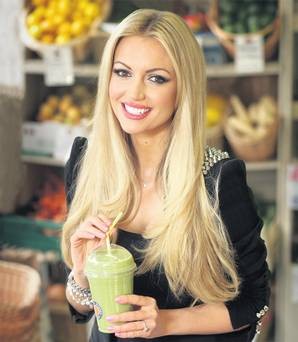
Shopping List
2015-03-05 22:19:10

Ingredients
- There's no need to go out and buy all of these ingredients, but it's to get an idea of the foods to stock most regularly in your fridge and pantry.
Vegetables: Our fridge should be bursting with an array of colourful veggies. Some of the best options include
- Greens: Baby spinach, Kale, lettuce, beet greens, collard greens, cucumber, courgette, asparagus, chicory, rocket, parsley, coriander, lettuce, Swiss chard
- Cruciferous Vegetables: Cabbage, broccoli, cauliflower, Brussels sprouts
- Starchy and Root Vegetables: Butternut squash, sweet potato, pumpkin, carrots, turnips, parsnips, onion, spring onion, beetroot, leek, Jerusalem artichoke.
- Nightshade Vegetables: Tomatoes, aubergine, peppers, potato
- Fatty vegetables: Avocado, olives
- Sea Vegetables: Nori sheets and flakes, kombu, dulse, wakame
Fruit: Organic fruit is always advisable, especially when buying known pesticide-sprayed fruits like apples, strawberries and grapes. If it's not possible to buy organic, then always wash fruit well before eating
- Berries and grapes: Blackberries, blueberries, cherries, strawberries, gooseberries, raspberries, loganberries, blackcurrants, red currants, green, red and purple grapes
- Stoned and seeded fruits: Plums, nectarines, peaches, apricots, apples, pears, figs
- Tropical and sweet fruits: Lychees, passion fruit, bananas, pineapple, mango, papaya, honeydew and cantaloupe melon, watermelon, persimmon, dragon fruit
- Citrus fruits: Oranges, satsumas, grapefruit, lemons, limes.
Nuts and Seeds: These should be unsalted and raw, not roasted. It's best to store them in the fridge as this prevents rancidity and increases their shelf-life. Aim to soak small quantities for at least two hours in cold filtered water before eating them, to improve their digestibility
- Walnuts
- Pecans
- Brazil nuts
- Hazelnuts
- Almonds
- Flaxseeds (linseeds)
- Sesame seeds
- Pumpkin seeds
- Sunflower seeds
- Pine Nuts
- Poppy seeds
- Chia seeds
- Hemp seeds
- Macadamia nuts
- Coconut
Nut Butters: It's best to look out for raw brands or even make your own at home! Store in the fridges to preserve their fats. It's best to avoid peanut butter due to its toxic moulds
- Hazelnut butter
- Almond butter
- Brazil Nut Butter
- Cashew butter
- Pumpkin seed butter
- Tahini
- Coconut butter
Gluten-Free Grains
- Oats (Preferably gluten-free)
- Oat groats
- Amaranth
- Millet flakes
- Buckwheat flakes
- Buckwheat groats
- Quinoa and Quinoa Flakes
- Bulgar wheat
- Brown rice
- Wild rice
- Gluten-free Oat cakes (avoid ones with additives, added sugar and trans-fats)
- Buckwheat pasta
- Rice noodles
Flours
- Brown rice flour
- Almond flour
- Chickpea flour
- Coconut flour
- Oat flour
- Psyllium husks
Beans and Legumes: Widely available. Buy dried beans and lentils to soak and cook at home, rather than tinned versions. Look out for beans sold in cartons (Tesco stocks them) or sprout your own at home
- Chickpeas
- Borlotti beans
- Flageolet beans
- Green and Split Peas
- Butter beans
- Kidney beans
- Black-eyed beans
- Cannelini beans
- Lentils
Dairy Alternatives: Widely available. Make sure to buy the unsweetened version, and avoid those sweetened with agave syrup. Avoid brands containing carageenan
- Low-fat coconut milk (I use Koko Coconut Milk)
- Almond milk
- Hazelnut milk
- Rice milk
- Hazelnut milk
- Quinoa milk
- Brazil nut milk
Oils and Vinegars: Widely Available
- Organic virgin coconut oil
- Organic virgin Olive Oil
- Flaxseed Oil
- Sesame Oil
- Cold pressed Pumpkin seed oil
- Walnut oil
- Cider vinegar
- Red wine vinegar
- Raw Apple Cider Vinegar (I use the Bragg brand)
- Coconut Aminos
- Bragg Liquid Aminos
- Tamari Sauce
Condiments/ Specialist Ingredients: Some are only available in health food shops
- Raw Cacao Powder
- Cacao Nibs
- 70%+ Dark Chocolate
- Nutritional Yeast
- Wholegrain Mustard
- Sun dried tomatoes
- Artichoke hearts
- Olives
- Vanilla extract
- Peppermint oil
- Dried white mulberries
- Sun Warrior Protein Powder (Chocolate, vanilla or plain)
- Organic miso paste
- Pink Himalayan sea salt
- Chlorella tablets and Spirulina powders
Sweeteners: Almost all can be bought in good supermarkets
- Organic Maple Syrup
- Honey (Preferably raw and locally produced. This is not vegan and contains fructose, so better for limited use)
- Xylitol
- Stevia
- Coconut Palm Sugar
- Coconut Nectar
- Organic raisins
- Dried unsweetened cranberries
- Dates
- Prunes
- Dried apricots (avoid brands containing preservatives like sulphur dioxide)
- Dried unsweetened mango
- Blackstrap molasses
Herbs and Spices: Available in all good supermarkets
- Turmeric
- Paprika
- Ginger
- Garlic and garlic paste
- Rosemary
- Basil
- Thyme
- Parsley
- Oregano
- Allspice
- Chilli powder
- Cumin
- Coriander
- Cinnamon
- Nutmeg
- Star anise
- Wasabi paste
- Miso
- Low-salt vegetable stock
- Vanilla pods
- Lemongrass
Drinks: Most available in any good supermarket
- Dandelion coffee
- Redbush /rooibos tea
- Herbal teas: Ginger, chamomile, peppermint, green tea, liquorice, cinnamon, chai etc.
- Coconut water
Rosanna Davison Nutrition https://www.rosannadavisonnutrition.com/
Stockists:
I buy almost all my fresh organic fruit and veg, gluten-free grains, beans and pulses, nuts, seeds, nut butters and dairy-free milks from one supermarket.
For the specialist staples I use in a lot of recipes, such as Sun Warrior vegan protein powder, Marigold Nutritional Yeast, raw cacao powder, liquid Stevia, Xylitol and Bragg Organic Apple Cider vinegar, I usually buy from Nourish or Health Matters.
